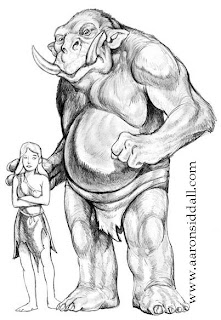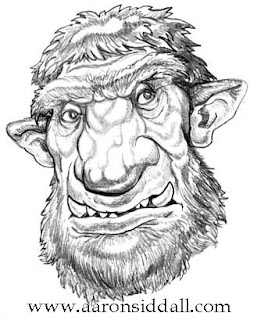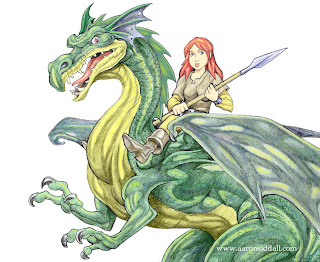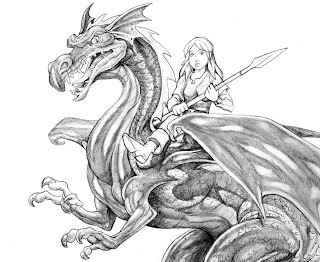There was a poor man that had twelve children and was forced to work night and day to give them enough to eat. When the thirteenth came into the world, he didn’t know what to do, but ran out into the great highway, and resolved to ask the first person whom he met to be godfather.
The first to meet him was the good God who already knew what filled his heart, and said to him, "Poor man, I pity thee. I will hold thy child at its christening, and will take charge of it and make it happy on earth."
The man said, "Who art thou?" "I am God." "Then I do not desire to have thee for a godfather," said the man; "thou gives to the rich, and leave’s the poor to hunger." Thus spoke the man, for he did not know how wisely God apportions riches and poverty. He turned therefore away from the Lord, and went farther.
Then the Devil came to him and said, "What seekest thou? If thou wilt take me as a godfather for thy child, I will give him gold in plenty and all the joys of the world as well."
The man asked, "Who art thou?" "I am the Devil." "Then I do not desire to have thee for godfather," said the man; "thou deceives men and leads them astray."
He went onwards, and then came Death striding up to him with withered legs, and said, "Take me as godfather."
The man asked, "Who art thou?" "I am Death, and I make all equal." Then said the man, "Thou art the right one, thou takes the rich as well as the poor, without distinction; thou shall be godfather." Death answered, "I will make thy child rich and famous, for he who has me for a friend can lack nothing."
The man said, "Next Sunday is the christening; be there at the right time." Death appeared as he had promised, and stood godfather quite in the usual way.
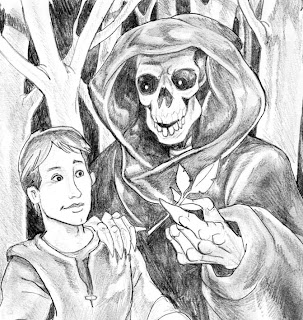 When the boy had grown up, his godfather one day appeared and bade him go with him. He led him forth into a forest, and showed him a herb which grew there, and said, "Now shall thou receive thy godfather's present. I make thee a celebrated physician. When thou art called to a patient, I will always appear to thee. If I stand by the head of the sick man, thou may say with confidence that thou wilt make him well again, and if thou gives him of this herb he will recover; but if I stand by the patient's feet, he is mine, and thou must say that all remedies are in vain, and that no physician in the world could save him. But beware of using the herb against my will, or it might fare ill with thee."
When the boy had grown up, his godfather one day appeared and bade him go with him. He led him forth into a forest, and showed him a herb which grew there, and said, "Now shall thou receive thy godfather's present. I make thee a celebrated physician. When thou art called to a patient, I will always appear to thee. If I stand by the head of the sick man, thou may say with confidence that thou wilt make him well again, and if thou gives him of this herb he will recover; but if I stand by the patient's feet, he is mine, and thou must say that all remedies are in vain, and that no physician in the world could save him. But beware of using the herb against my will, or it might fare ill with thee."
It was not long before the youth was the most famous physician in the whole world. "He had only to look at the patient and he knew his condition at once, and if he would recover, or must needs die." So they said of him, and from far and wide people came to him, sent for him when they had any one ill, and gave him so much money that he soon became a rich man.
Now it so befell that the King became ill, and the physician was summoned, and was to say if recovery were possible. But when he came to the bed, Death was standing by the feet of the sick man, and the herb did not grow which could save him. "If I could but cheat Death for once," thought the physician, "he is sure to take it ill if I do, but, as I am his godson, he will shut one eye; I will risk it." He therefore took up the sick man, and laid him the other way, so that now Death was standing by his head. Then he gave the King some of the herb, and he recovered and grew healthy again.
But Death came to the physician, looking very black and angry, threatened him with his finger, and said, "Thou hast overreached me; this time I will pardon it, as thou art my godson; but if thou ventures it again, it will cost thee thy neck, for I will take thee thyself away with me."
Soon afterwards the King's daughter fell into a severe illness. She was his only child, and he wept day and night, so that he began to lose the sight of his eyes, and he caused it to be made known that whosoever rescued her from death should be her husband and inherit the crown. When the physician came to the sick girl's bed, he saw Death by her feet. He ought to have remembered the warning given by his godfather, but he was so infatuated by the great beauty of the King's daughter, and the happiness of becoming her husband, that he flung all thought to the winds. He did not see that Death was casting angry glances on him, that he was raising his hand in the air, and threatening him with his withered fist. He raised up the sick girl, and placed her head where her feet had lain. Then he gave her some of the herb, and instantly her cheeks flushed red, and life stirred afresh in her.
When Death saw that for a second time he was defrauded of his own property, he walked up to the physician with long strides, and said, "All is over with thee, and now the lot falls on thee," and seized him so firmly with his ice-cold hand, that he could not resist, and led him into a cave below the earth. There he saw how thousands and thousands of candles were burning in countless rows, some large, others half-sized and others small. Every instant some were extinguished, and others again burnt up, so that the flames seemed to leap hither and thither in perpetual change.
"See," said Death, "these are the lights of men's lives. The large ones belong to children, the half-sized ones to married people in their prime, the little ones belong to old people; but children and young folks likewise have often only a tiny candle." "Show me the light of my life," said the physician, and he thought that it would be still very tall. Death pointed to a little end, which was just threatening to go out, and said, "Behold, it is there."
